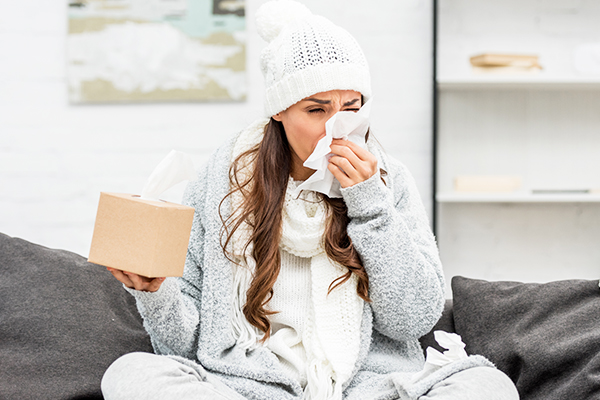In this article:
A runny nose is characterized by excessive nasal discharge. Also known as rhinorrhea, it results from swelling or irritation in the nasal tissue, which can be due to various reasons.

The discharge may range from a thin clear fluid to thick mucus, which runs out of the nose, down the throat, or both. The excess mucus may also impede airflow by blocking the nasal passage, thus causing nasal congestion.
The Nose as an Immune Barrier
The mucous membrane is a thin, moist layer of tissue that lines the nasal passageway. Its primary function is the production of mucus, a thick, sticky fluid that prevents the entry of foreign particles into the lungs by trapping them.
These entrapped foreign particles are then expelled out of the nose, along with the mucus, by sneezing, thus helping clear the lungs, sinuses, and back of the nose. This mechanism of protecting the airways is known as mucociliary clearance.
Causes of a Runny Nose
The presence of pathogens (virus or bacteria) or other foreign particles in the nasal passageways can stimulate the overproduction of mucus as a clearing response.
The body may be unable to process the excess mucus, resulting in the accumulation of the fluid, which is then discharged, resulting in a runny nose.
A runny nose can be triggered by various reasons, including:
- Flu
- Sinus infection
- Common cold
- Consumption of spicy foods
- Exercise
- Allergies such as hay fever
- Exposure to hot or cold temperature
- Pregnancy (pregnancy rhinitis)
- Use of certain types of over-the-counter (OTC) nasal sprays or drops for more than 3 days
- Hormonal changes
- Enlarged adenoids
- Nasal polyps (sac-like growths on the nasal lining or sinuses)
- Vasomotor rhinitis (a chronic form of rhinitis that causes rhinorrhea, intermittent sneezing, and congestion)
Symptoms That Accompany a Runny Nose

A runny nose can be accompanied by the following symptoms:
- Excessive mucus production
- Difficulty in breathing
- Nasal congestion
- Headache or facial pain
- Sinusitis, if the sinus passage is blocked
- Ear pain or infection caused by plugging up of the Eustachian tube with mucus
- Sore throat or cough resulting from postnasal drip
- Sneezing
- Nosebleeds
Medical Treatment for a Runny Nose
Generally, rhinorrhea does not require the intervention of medicines and can be managed with self-care. However, if the ailment persists, it is necessary to seek medical help as a lack of treatment can cause headaches, earaches, cough, and other complications.
The medications for runny nose generally depend on its cause. You can use OTC medications such as topical ipratropium bromine nasal sprays. (1) However, avoid giving it to children below 6 years of age.
Note: Always consult your doctor before trying OTC medications and make sure you are not allergic to them.
Complications Associated With a Runny Nose
In some people, a persistent runny nose may lead to the following complications:
- Nasal irritation and obstruction, which hamper the quality of life
- Trouble breathing, which can interfere with facial development in infants
- Severe infections if the acute infection that causes the runny nose is left untreated
- Ear problems and trouble hearing
When to See a Doctor

Rhinorrhea causes discomfort but generally clears up on its own. However, in rare cases, it may be indicative of a severe problem.
It is recommended to visit a doctor if:
- The condition is prolonged (lasts for 10 days or more).
- A runny nose is accompanied by fever.
- The mucus is yellow or green, and the runny nose is accompanied by fever or sinus pain (may indicate bacterial infection).
- Blood is present in the nasal discharge.
- Head injury is followed by a persistent clear discharge.
- Your child is having breathing difficulties due to congestion.
Final Word
The drainage of excess fluid from the nose is known as rhinorrhea or runny nose. It can be either a constant or an intermittent problem that may occur due to many reasons.
While rhinorrhea can be discomforting, it often resolves on its own. In some cases, rhinorrhea may indicate a severe condition and require proper treatment. Rhinorrhea is a severe condition for infants.

- Was this article helpful?
- YES, THANKS!NOT REALLY


